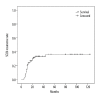Determination of Risk Factors Related to Supraclavicular Recurrence for Limited-Stage Small Cell Lung Cancer (SCLC) Patients
- PMID: 31273183
- PMCID: PMC6626499
- DOI: 10.12659/MSM.916279
Determination of Risk Factors Related to Supraclavicular Recurrence for Limited-Stage Small Cell Lung Cancer (SCLC) Patients
Abstract
BACKGROUND This research aimed to determine high-risk factors of supraclavicular recurrence for limited-stage small cell lung cancer (LS-SCLC) patients to discover a potential subpopulation that can benefit from prophylactic supraclavicular irradiation (PSCI). MATERIAL AND METHODS Between July 2006 and July 2011, LS-SCLC patients without supraclavicular lymph node (SCLN) involvement consecutively treated with concurrent chemo-radiation but without PSCI in the Radiotherapy Department of the Cancer Institute and Hospital of Tianjin Medical University, were retrospectively analyzed. SCLN recurrence rate, overall survival (OS), and distant metastasis-free survival (DMFS) were assessed. Binary logistic regression analysis was conducted to discover the high-risk factors related to the SCLN recurrence. The receiver operating characteristic (ROC) curves were drawn to evaluate logistic regression model prediction performance. RESULTS Eighty-eight LS-SCLC patients were analyzed in this study. During 99 months (ranging from 72 months to 124 months) for survivors, 28 (31.8%) had SCLN recurrence. There were significant differences for median DMFS and OS between LS-SCLC patients with and without SCLN recurrence. The logistic regression model revealed that lymphadenopathy at mediastinal level 2 and level 3 prior to chemotherapy were significantly associated with SCLN recurrence, which was validated by ROC. CONCLUSIONS Lymphadenopathy at mediastinal level 2 and level 3 prior to chemotherapy were the high-risk factors associated with SCLN recurrence for patients with LS-SCLC. Further work is needed to determine whether patients with these factors can benefit from PSCI.
Conflict of interest statement
None.
Figures
Similar articles
-
Supraclavicular lymph node incisional biopsies have no influence on the prognosis of advanced non-small cell lung cancer patients: a retrospective study.World J Surg Oncol. 2017 Jan 9;15(1):12. doi: 10.1186/s12957-016-1064-5. World J Surg Oncol. 2017. PMID: 28069039 Free PMC article.
-
Analysis of definitive chemo-radiotherapy for esophageal cancer with supra-clavicular node metastasis based on CT in a single institutional retrospective study: a propensity score matching analysis.Radiat Oncol. 2018 Oct 16;13(1):200. doi: 10.1186/s13014-018-1145-4. Radiat Oncol. 2018. PMID: 30326912 Free PMC article.
-
A clinical study to assess the pathological involvement of occult supraclavicular lymphnode metastasis in case of locally advanced operable breast carcinoma.Indian J Cancer. 2015 Jul-Sep;52(3):282-5. doi: 10.4103/0019-509X.176711. Indian J Cancer. 2015. PMID: 26905111
-
[The role of surgical resection in treating small cell lung cancer].Ai Zheng. 2007 Jul;26(7):795-7. Ai Zheng. 2007. PMID: 17626763 Review. Chinese.
-
[Advances in study on the therapy for limited-stage small cell lung cancer].Zhong Nan Da Xue Xue Bao Yi Xue Ban. 2013 Aug;38(8):857-62. doi: 10.3969/j.issn.1672-7347.2013.08.017. Zhong Nan Da Xue Xue Bao Yi Xue Ban. 2013. PMID: 23982001 Review. Chinese.
Cited by
-
What is the effect of tumor diameter, lymph node metastases, and SUVmax value on prognosis in limited-stage small cell lung cancer?Rev Assoc Med Bras (1992). 2022 Sep;68(9):1252-1258. doi: 10.1590/1806-9282.20220325. Rev Assoc Med Bras (1992). 2022. PMID: 36228257 Free PMC article.
References
-
- Micke P, Faldum A, Metz T, et al. Staging small cell lung cancer: Veterans Administration Lung Study Group versus International Association for the Study of Lung Cancer – what limits limited disease? Lung Cancer. 2002;37:271–76. - PubMed
-
- Le Pechoux C, Dunant A, Senan S, et al. Standard-dose versus higher-dose prophylactic cranial irradiation (PCI) in patients with limited-stage small-cell lung cancer in complete remission after chemotherapy and thoracic radiotherapy (PCI 99-01, EORTC 22003-08004, RTOG 0212, and IFCT 99-01): A randomised clinical trial. Lancet Oncol. 2009;10:467–74. - PubMed
-
- Pignon JP, Arriagada R. Role of thoracic radiotherapy in limited-stage small-cell lung cancer: Quantitative review based on the literature versus meta-analysis based on individual data. J Clin Oncol. 1992;10:1819–20. - PubMed
-
- Takada M, Fukuoka M, Kawahara M, et al. Phase III study of concurrent versus sequential thoracic radiotherapy in combination with cisplatin and etoposide for limited-stage small-cell lung cancer: Results of the Japan Clinical Oncology Group Study 9104. J Clin Oncol. 2002;20:3054–60. - PubMed
MeSH terms
LinkOut - more resources
Full Text Sources
Medical




